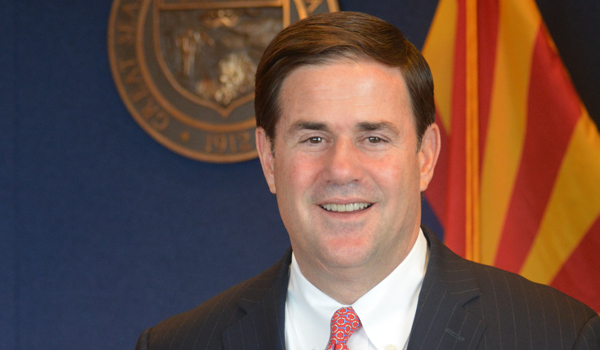Resting on a table in the center of Arizona Gov. Doug Ducey’s meeting room at the state capitol is an Arizona State University football helmet signed by Jake Plummer and Pat Tillman.
“I am a proud Sun Devil,” Ducey gushes.
But the state’s “first fan” can also boast about another first: Ducey is the first ASU graduate to go on to become governor.
“That speaks to what a place of opportunity Arizona has become,” says Ducey, a Republican who was voted into office one year ago and succeeded Jan Brewer. “I lived in Ohio until I was 18 years old. When I came here, I didn’t know one person and had never been to Arizona. This became my home and this is also where I grew my business, Cold Stone Creamery. Arizona is a real place of opportunity and that theme of ‘opportunity for all’ was what motivated me to run for governor. I want people to see a better future for themselves in Arizona.”
Az Business magazine sat down with Ducey to talk about his first year in office.
Az Business: What is the biggest difference between being CEO of a business and being governor of Arizona?
Doug Ducey: You get a lot of undeserved popularity when you’re selling ice cream. When you come into the government world, there is a focus on results like there is in the private sector, but government is often focused more on process than it is on results.
One thing we’ve worked really hard on in terms of the culture we have in our administration is an important similarity between the private sector and the public sector and that’s the people you have involved. So whether it’s our senior staff, the agency heads we are naming, or the differences we’ve made in terms of naming a chief operating officer at the government level, it is all being done to make sure we have the right people in the right places and they’re focused on getting the right results.
AB: How important was your business background in preparing you to be governor?
DD: It’s been invaluable. Part of the problem with our system is career politicians. When some of my friends ask sheepishly, “How do you like it?” I tell them I really am having a blast. If you have the leadership bug, you should scratch it. I wish we had more people from the private sector who were involved in public life, but I don’t think politics is something you should do your whole life. The fact is that I’m here and this is the job I wanted — a chief executive role at the highest level of state government — and we are showing that we can get things done. I want to stay focused on that agenda. But whenever I am at a crossroads here or find myself stuck, it’s my private-sector training that I rely on, not what I see in government or from politicians across the country.
AB: You recently traveled to Israel for an international conference on water technologies. What was your biggest takeaway from that trip?
DD: Israel is doing so many things well from an innovation and entrepreneurship standpoint. Their neighbors are Lebanon, Syria, Jordan and Egypt. Everything they do, they have to be able to export. They have to be a little bit better and they have to be really focused on a sense of purpose every day. It was neat to see the history up close and it was interesting to see what a culture of entrepreneurship they’ve created. In many ways, they’ve rediscovered some of what we’ve forgotten in our country about entrepreneurship.
AB: Are there things the Israelis are doing right from which we can learn?
DD: They’re great at water. We’re very good at water, but they are the superpower of the world when it comes to water. They are a nation in the middle of a desert and they cannot rely on any of their neighbors. Water, cybersecurity and even the way they manage their airport security and border security are all things we can reapply to Arizona and our nation.
AB: Should Arizona be worried about its water supply?
DD: Arizona had to plan for water. California hasn’t given water a second thought. We are sitting in the fifth-largest city in the country in the middle of the desert. This is something Arizona has been very good at for a long time and I get to stand on the shoulders of giants who planned and put the policies in place and created generational projects like the Central Arizona Project, the Salt River Project and Roosevelt Dam. Part of what we were gleaning in Israel was what’s next in terms of water and water technology and what are the opportunities for Arizona with things like desalination. One of the speakers was a California assemblyman who said, “California is in the crisis it is in because we never gave this a second thought. We don’t even have water meters in Sacramento.” It was stunning and shocking to hear someone say that out loud, so they are in a real crisis. Arizona has 9 million acre feet (of water) in storage, the equivalent of enough water for 18 million households. We’ve planned ahead, but there will always be work to be done on water. But we’ve laid the groundwork and we have a bright future.
AB: What are Arizona’s greatest assets for growing the state’s economy?
DD: We have a great quality of life here. Two-thirds of our people were born somewhere else and made a decision to call Arizona their home. I am one of those people. We have a great place to live, work, play, recreate, retire, visit, build a business and get an education. I want the rest of the country to see us for what we are and the governor can be a lead spokesperson for that.
AB: How can we attract the best talent and best companies to Arizona?
DD: You look at other states in other parts of the country and they are oftentimes turnaround projects. Some of these states are taking their largest cities through bankruptcy. That’s not the situation in Arizona at all. In many ways, we are an under-appreciated and undervalued asset. We need a better plan. We need a better promotion schedule in terms of how we communicate with the rest of the world. We are showing we have brought a lot of talent here. We want to make sure we are developing talent in our K-12 system and university system. I think we will be a state that continues to grow and enjoy net in-migration. I cannot think of a better leading indicator of a quality of life for economic attractiveness and we need to maximize that.
AB: State Republican leaders are proposing a $3.5 billion increase to school funding over the next decade. What does that mean to you?
DD: What’s most important is that our kids are able to go to school and learn something of value that they can apply in the real world. So how do you get those outcomes and the right results? Part of this is resources. The most important thing in any classroom is the teacher, so I want to make sure teachers in Arizona feel respected, rewarded and we are retaining our best teachers. We are able to take these dollars, put them into the baseline formula and put more than $2 billion in additional fresh money into K-12 education in the next 10 years. That speaks to our commitment to our kids. We are able to do that without raising taxes and we are going to be able to follow reforms to show that we are getting results. That’s what most important — the results we get from this money.
AB: You’ve put an emphasis on balancing the state budget. How do you view that goal after your first year in office?
DD: The first job of any governor is to make sure he or she is protecting the citizens of the state and to make sure the state is living within its means and not writing checks that it can’t cash later on just for popularity or positive political favors. We did have to make difficult decisions, but we are in a spot now because of those tough decisions where we have $233 million in a cash-carry-forward state. I don’t know how many other states are in that kind of positive cash flow position. In addition, we have a credit upgrade by S&P and Moody’s. These are real things that have consequences that will save our taxpayers, cities and counties money over time because they will be able to borrow dollars at a lower rate. We thought that (balancing the state budget) was job No. 1. We knew that would be a challenge to do, but we came in with the idea of financial responsibility and living within our means and we have the first structurally balanced budget since 2007 and we are going to keep it balanced.
AB: In what sectors should Arizona be focusing its economic development efforts?
DD: I get to talk with a lot of experts, but there are real no experts on what’s next or what the future is going to be. Look at the things we enjoy on our smartphones that we wouldn’t have imagined just a few years ago. But I think you want to play to your strengths. We are strong in aerospace and defense and we are strong in technology and that’s where the world is going, so you do want to focus on that. At the same time, you want to have a broad-based, attractive business environment that looks at things like tax code, regulatory issues and the burden around that, the amount of liability and litigation that’s going to be on the small business owner and the taxpayer, water, energy, infrastructure and political predictability so business leaders don’t get the rug pulled out from underneath them. From this standpoint, Arizona is a very attractive place.
AB: What legacy do you hope to leave as governor?
DD: I think you want to leave the state better than you found it. We have big plans and big ideas as to what we can do in terms of being a leader nationally, economically, around innovation and in K-12 education. Those are things we want to do with this administration. If this is a place where people continue to come from other parts of the country and other parts of the world to find a better quality of life, that will tell us we have done our job.
AB: Do you like any of the presidential candidates?
DD: I like a lot of them. I think we have high-quality slate of candidates, but we need to get it down to four or five people and decide on a nominee. The polling reflects that people want to see a fresh approach — that outsider or business-like message that may be missing from our political discourse. I certainly saw that when I ran for governor. The idea that I came from the business community and built a local business was powerful, not only in terms of what I already knew and what was important to the voters, but also the idea of listening to the customer, in this case the taxpayer. I think you’re going to see a candidate emerge who taps into what is most important to Americans at this time.
AB: Any aspirations for a higher office?
DD: I’m 100 percent focused on being the governor of Arizona. We are in the first year here. I’m thoroughly enjoying it, but this is a big job and I’m 100 percent focused on it.




